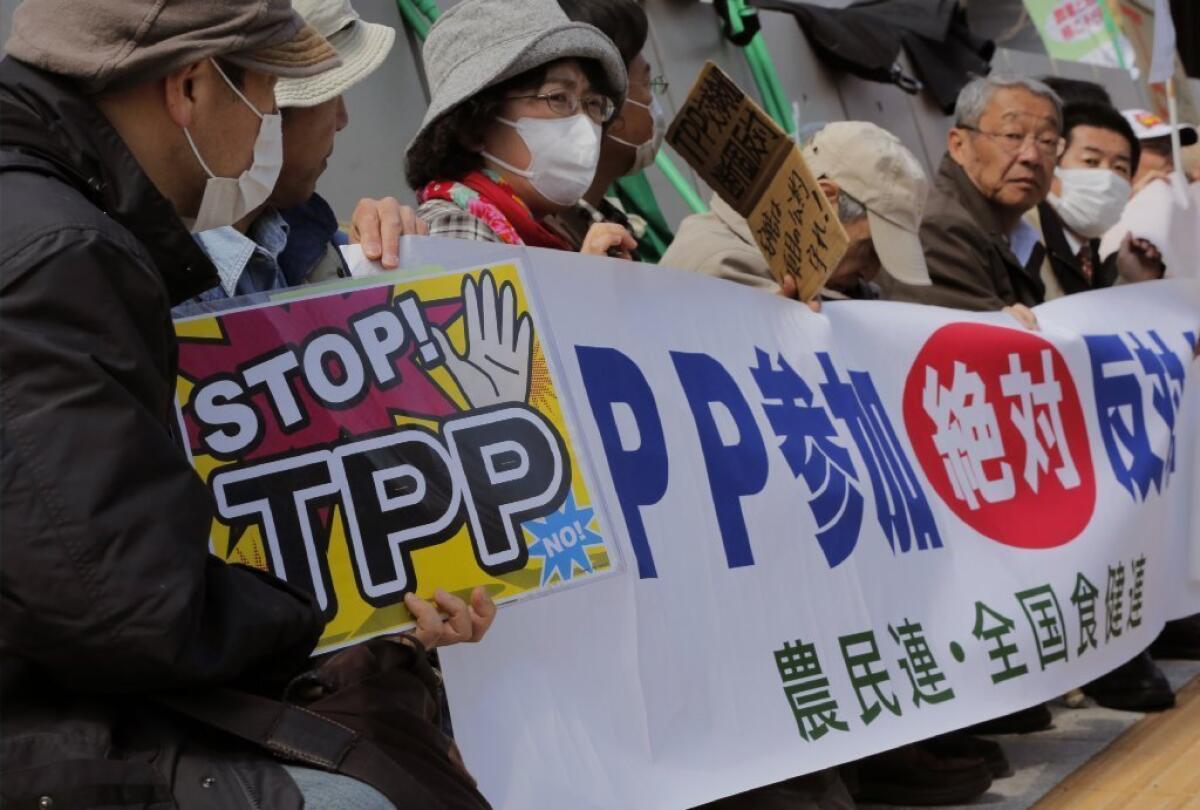Japan seeks to join Asia-Pacific trade pact

- Share via
WASHINGTON -- Japan intends to join the talks for an ambitious free-trade pact with the U.S. and 10 other countries, raising the economic stakes of the negotiations but also potentially delaying agreement as American and Japanese interests tangle over protecting their respective car and farm markets.
The decision, announced Friday by Japanese Prime Minister Shinzo Abe, was expected after his White House meeting three weeks ago with President Obama, who sees the Trans-Pacific Partnership, or TPP, as a way to strengthen the U.S. economy and influence in the Asia-Pacific region.
Japan is Washington’s most important ally in East Asia and the world’s third-largest economy, behind China and the U.S. American officials have welcomed Japan’s entry in the ongoing talks, even as they prepare for greater scrutiny and resistance at home, from organized labor, some manufacturers and lawmakers.
Earlier this week, dozens of congressional Democrats, including key members overseeing trade, expressed concerns in a letter to Obama about Japan’s participation in the TPP, citing that nation’s history of erecting barriers to imported cars and worries about the possible harm to the U.S. auto industry should Japan have easier access to America’s market, particularly light trucks.
But congressional and the American public’s feelings toward Japan are far better today than in the period of bilateral trade friction of the 1980s and early 1990s, and some major American business groups as well as more moderate Democrats and their supporters are squarely behind Japan’s involvement in the TPP.
“It adds the economic heft of Japan’s $4-trillion economy to these groundbreaking trade negotiations, and offers the prospect of significant new export opportunities for the United States and American workers,” said Edward Gerwin Jr., senior fellow for trade policy at Third Way, a centrist Democratic think tank.
For Japan and Abe, the big political sticking point concerns rice and other farm goods, which have long been highly protected against import competition. Abe’s Liberal Democratic Party has strong ties to farmers and other rural voters, and the prime minister has repeatedly pledged to protect their interests.
Since taking power late last year, Abe has pushed through measures in a bid to break the Japanese economy out of its two-decade-long struggles with deflation and stagnant growth. In announcing that Japan is seeking to join TPP, Abe said Friday that it was “our last chance” to take part in the global trade-rule-making and secure the country’s economic future.
If Japan continues to be “inward-looking,” he said, the country will give up the hope of growth.
The TPP talks began in March 2010 and now include Canada, Mexico, Vietnam, Australia and Chile. With Japan, the parties involved in the TPP would represent close to two-fifths of the world economy.
ALSO:
U.S. trade deficit surges in January on oil imports
U.S., Japan focus on trade to boost both economies
Japan’s central bank pledges new stimulus to combat deflation
More to Read
Inside the business of entertainment
The Wide Shot brings you news, analysis and insights on everything from streaming wars to production — and what it all means for the future.
You may occasionally receive promotional content from the Los Angeles Times.











